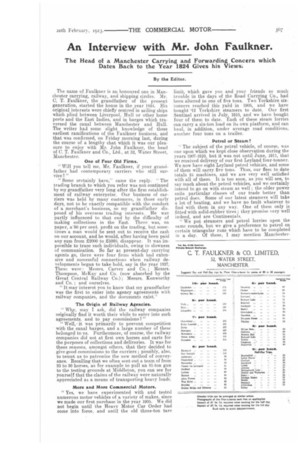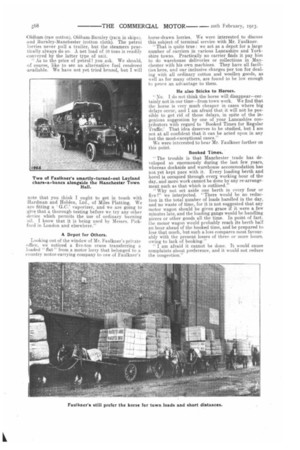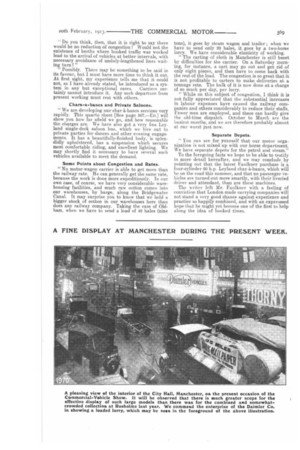An Interview with Mr. John Faulkner.
Page 23

Page 24

Page 25

If you've noticed an error in this article please click here to report it so we can fix it.
The Head of a Manchester Carrying and Forwarding Concern which Dates Back to the Year 1824 Gives his Views
By the Editor.
The name of Faulkner is an honoured -one in Manchester carrying, railway, and shipping circles. Mr. C. T. Faulkner, the grandfather of the present generation, started the house in the year 1824. His original interests were chiefly centred in sailing ships which plied between Liverpool, Hull or other home ports and the East Indies, and in barges which traversed the canal between Manchester and Hull. The writer had some slight knowledge of these earliest ramifications of the Faulkner business, and that was confirmed, on Friday morning last, during the course of a lengthy chat which it was our pleasure to enjoy with Mr. John Faulkner, the head of C. T. Faulkner and Co., Ltd., at 32, Water Street, Manchester.
One of Four Old Firms.
" Will you tell me, Mr. Faulkner, if your grandfather had contemporary carriers who still survive? "
" Some certainly have," came the reply" The trading branch to which you refer was not continued by my grandfather very long after the firm establishment of railway enterprise. Our business of carriers was held by many customers, in those early days, not to be exactly compatible with the conduct of a merchant's business, so my grandfather disposed of his overseas trading interests. He was partly influenced to that end by the difficulty of making collections in the East. There was, on paper, a'50 per cent, profit on the trading, but sometimes a man would be sent out to receive the cash on our account, and he would, after having been paid any sum from 22000 to 25000. disappear. It was impossible to trace such individuals, owing to slowness of communication. So far as present-day carrying agents go, there were four firms which had extensive and successful connections when railway developments began to take hold, say in the year 1837. These were : Messrs. Carver and Co. ; Messrs. Thompson, McKay and Co. (now absorbed by the Great Central Railway Co.); Messrs. Kenworthy and Co. ; and ourselves.
" It may inteaest you to know that my grandfather was the first to enter into agency agreements with railway companies, and the documents exist.'
The Origin of Railway Agencies.
"Why, may I ask, did the railway companies originally find it worth their while to enter into such agreements, and to pay commissions? " "Well,it was primarily to prevent competition • with the canal barges, and a large number of these belonged to us. Furthermore, of course, the railway companies did not at first own horses and carts for the purposes of collections and deliveries. It was for these reasons, amongst others, that they decided to give good commissions to the carriers ; possibly, also. to tempt us to patronize the new method of conveyance. Recalling that we often sent out a team. of from 25 to 30 horses, as for example to pull an 81-ton gun to the testing grounds at Middleton, you can see for yourself that the claims of the railway were naturally appreciated as a means of transporting heavy loads.
More and More Commercial Motors.
" Yes, we have, experimented with and tested numerous motor vehicles of a variety of makes, since we made our first purchase in the year 1905. We did not begin until the Heavy Motor Car Order had come into force, and until the old three-ton tare limit, which gave you and your friends so much trouble in the days of the Road Carrying Co., had been altered to one of five tons. Two Yorkshire sixtormers reached this yaid in 1905, and we have bought '-12 Yorkshire steamers to date. Our first Sentinel arrived in July, 1910, and we have bought four of them to date. Each of these steam lorries can carry a six-ton load on its own platform, and can haul, in addition, under average road conditions, another four tons on a trailer.
Petrol or Steam?
" The subject of the petrol vehicle, of course, was one upon which we kept close observation during the years 1907-1910, but it was not until June, 1911, that we received delivery of our first Leyland four-toriner. We now have eight Leyland petrol vehicles, and some of them will carry five tons. Thus, our fleet to date totals 24 machines, and we are very well satisfied with all of them. It is too soon, as you will-see, to say much about the petrol vehicles, and we-certainly intend to go on with steam as well; the older power suits particular classes of our trade better than petrol does. Some of our latest steamers will take a lot of beating, and we have no fault whatever to find with them in any way. One of them only is fitted with solid-rubber tires ; they promise very well indeed, and are Continentals. "We put steamers and petrol lorries upon the same rounds, but we give a preference to petrol on
certain triangular runs which have to be completed in a day. Of these, I may mention Manch-ester
Oldham (raw cotton), Oldham-Burnley (yarn in skips). and Burnley-Manchester (cotton cloth). The petrol lorries never pull a trailer, but the steamers practically always do so. A net load of 10 tons is readily conveyed by the latter type of unit.
" As to the price of petrol? you ask. We should, of course, like to see an alternative fuel rendered available. We have not yet tried benzol, but I will note that you think I ought to get in touch with Hardman and Holden, Ltd., of Miles Platting. We are fitting a ' G.C.' vaporizer, and we are going to give that a thorough testing before we try any other device which permits the use of ordinary burning oil. I know that it is being used by Messrs. Pick-ford in London and elsewhere!'
A Depot for Others.
Looking out of the window of Mr. Faulkner's private office, we noticed a five-ton crane transferring a loaded " flat " from a motor lorry that belonged to a country motor-carrying company to one of Faulkner's horse-drawn lorries. We were interested to discuss this subject of terminal service with Mr. Faulkner. " That is quite true : we act as a depot for a large number of carriers in various Lancashire and Yorkshire towns. Practically no carrier finds it pay him to do warehouse deliveries or collections in Manchester with his own machines. They have all facilities here, and our inclusive charges per ton for dealing with all ordinary cotton and woollen goods, as well as for many others, are found to be low enough to prove an advantage to them.
He also Sticks to Horses.
"No. I do not think the horse will disappear—certainly not in our time—from town work. We find that the horse is very much cheaper in cases where big delays occur, and I am afraid that it will not be possible to get rid of those delays, in spite of the ingenious suggestion by one of your Lancashire contributors with regard to Booked Times for Regular Traffic.' That idea deserves to be studied, but I am not at all confident that it can be acted upon in any but the most-exceptional eases." We were interested to hear Mr. Faulkner further on this point.
hooked Times.
"The trouble is that Manchester trade has developed BO enormously during the last few years, whereas dockside and warehouse accommodation has not yet kept pace with it. Every loading berth and hovel is occupied through every working hour of the day, and more work cannot be done by any re-arrangement such as that which is outlined."
"Why not set aside one berth in every four or five ?" we interjected. "There would be no reduction in the total number of loads handled in the day, and no waste of time, for it is not suggested that any motor wagon should be given grace if it were a few minutes late, and the loading gangs would be handling pieces or other goods all the time. In point of fact. the motor wagon would probably reach its berth half an hour ahead of the booked time, and be prepared to lose that much, but such a loss compares most favourably with the present losses of three or more hours. owing to lack of booking."
"I am afraid it cannot be done. It would cause complaints about preference, and it would not reduce the congestion." Do you think, then, that it is right to say there would be no reduction of congestion? Would not the existence of berths where booked traffic was worked lead to the arrival of vehicles at better intervals, with necessary avoidance of unduly-lengthened lines waiting turn ? "
-1( Possibly. There may be something to be said in its favour, but I must have more time to think it out. At first sight, my experience tells me that it could not, as I have already stated, be introduced as a sys tem in any but exceptional cases. Carriers certainly cannot introduce it. Any such departure from present working must rest with others.
Chars-a-banes and Private Saloons.
"We are developing our char-h-bancs services very rapidly. This quarto sheet [See page 567.—En1 will show you how far afield we go, and how reasonable the charges are. We have also got a very fine Leyland single-deck saloon bus, which we hire out to private parties for dances and other evening engagements. 11 has a. beautifully-finished body, is splendidly upholstered, has a suspension which secures most comfortable riding, and excellent lighting. We may shortly find it necessary to have several such vehicles available to meet the demand.
Some Points about Congestion and Rates.
" No motor-wagon carrier is able to get more than the railway rate. He can generally get the same rate, because the work is done more expeditiously. In our own case, of course, we have very considerable warehousing facilities, and much raw cotton comes into our warehouses, by barge, along the Bridgewater Canal_ It may surprise you to know that we hold a bigger stock of cotton in our warehouses here than does any railway company. Taking the case of Oldham, when we have to send a load of 40 bales (nine tons), it goes by steam wagon and trailer ; when we have to send only 20 bales, it goes by a, two-horse lorry. We have considerable elasticity of working.
" The carting of cloth in Manchester is still beset by difficulties for the carrier. On a Saturday morning, for instance, a cart may go out and get rid of only eight pieces, and then have to come back with the rest of the load. The congestion is so great that it is not profitable to carters to make deliveries at a. tonnage rate. The bulk of it is now done at a charge of so much per day, per lorry.
" While on this subject of congestion, I think it is not fully appreciated that the substantial increases in labour expenses have caused the railway companies and others considerably to reduce their staffs. Fewer men are employed, and these can hardly give the old-time dispatch. October to March are the busiest months, and we are therefore probably almost at our worst just now.
Separate Depots.
" You can see for yourself that our motor organization is not mixed up with our horse department. We have separate depots for the petrol and steam."
To the foregoing facts we hope to be able to testify in more detail hereafter, and we may conclude by pointing out that the latest Faulkner purchase is a four-cylinder 60 h.p. Leyland char-h-bancs, which will be on the road this summer, and that no passenger vehicles are turned out more smartly, with their liveried driver and attendant, than are these machines.
The writer left Mr. Faulkner with a feeling of conviction that London-made carrying companies will not stand a very good chance against experience and practice BO happily combined, and with an expresssed hope that he might yet become one of the first to help along the idea of booked times.
































